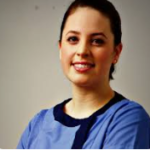Starting out as a young dentist can be daunting. Here, Natalie Bradley, Consultant in Special Care Dentistry and chair of the British Dental Association’s Young Dentist Committee, offers some words of comfort and advice to dentists in the early stages of their career.
It’s a good idea to gather some information so that you feel informed about what things will be like when you start your career. These days, people often turn to social media for information. While that’s not a bad idea, it’s important to remember that what you see on social media may not tell the whole story. It’s only one view of what the profession might be like.
Another thing to be wary of with social media posts is whether the content of that person’s posting is valid or not, or whether it’s genuine. Having said that, there are lots of positives about social media. For example, it’s easier to share information. But I think nothing replaces going out and talking to people and meeting others from different aspects of the profession as well. Everyone will have a different view of things within dentistry, so it’s good to get a variety of opinions.
Avoid preconceptions
Try to remain open-minded. I remember when I first qualified thinking that I wanted to go down a particular route. I was going to work in practice or get involved in teaching, and I was very strong-minded about that. Then I thought I would spend a year doing something else and see what it was like and that completely changed my perception of things.
So, make sure you’re challenging your preconceptions. It’s never too late to reassess what’s right for you at every stage in your career. Try not to disregard something because of what you have heard people say about private or NHS practices, or what it’s like working at hospitals because you don’t know. Until you try something for yourself, you will never know whether that would be the right thing for you to do at that point, depending on your interests and skills.
We’re all individuals, and everyone’s different, and it’s hard to know what your path would be because you can’t see into the future. You may have the idea that once you graduate, you’ll do another year of foundation training and then maybe a year or two of NHS dentistry before going into private practice. And that’s how a large percentage of dentists coming out of dental school think their career will look like. But that may not be the right path for you.
Think wider
Although a lot of people will take that route, there are also different things and settings you can try. You could try a nonclinical job or part-time dentistry alongside part-time something else. Everyone’s different. So, it’s about finding your ‘why’ and what makes you tick and get out of bed in the morning.
It’s fine to diversify what you do. It’s not about saying, ‘I’m a general dentist and that’s all I do.’, You can be a general dentist and also do facial aesthetics, or you can be a general dentist and also work in a hospital. You could even have a nonclinical job and also be a clinical dentist. There are lots of ways you can mix up your career. I believe there’s a lack of awareness that dentistry is a broad-scope career. Everyone thinks when they go to dental school that when they graduate, they’re probably going to be what their dentist or their orthodontist looks like because that’s what they’re aware of. But there are so many other things you can do.
Challenges
There are many challenges for dentists in general, but a specific one that young dentists face at the moment is not knowing what the future of NHS dentistry is going to look like. Sadly, I don’t have any advice because we just don’t know what NHS dentistry will look like in a few years. When I graduated, I was told not to worry about the NHS contract as it was being reformed and there would be a completely different contract by the time I finished my foundation training. And yet, here we are 10 years later with the same thing.
I know morale is low because of this, and all we hear about is the broken NHS system and the access crisis, which can be demoralising for someone just coming into the profession. And also, if you’re doing NHS work earlier in your career, it puts a lot of pressure on you as an individual and it is quite hard not to get burnt out. So, it’s important to make sure you have good support around you and that you have breaks. Don’t take the world on your shoulders, and don’t be a hero. Do the best you can for your patients, but ultimately you need to make sure you don’t get burnt out within the first year or two of graduating.
If you want to stay in dentistry, it needs to be sustainable, and you need to make sure you are realistic about what you can provide. You can still feed into trying to make change happen, but change takes time. People at the top of big organisations like the NHS and BDA have been campaigning for change since the contract came into place in 2006 and we still haven’t changed it really. So, it can be very frustrating but try not to be disheartened by that and just take on each individual patient as they come. Try to remain positive. It is quite easy to feel a bit doom and gloom about things, especially if you talk to certain people. But dentistry is a really fulfilling career and the difference you can make for individual people should never be forgotten.

